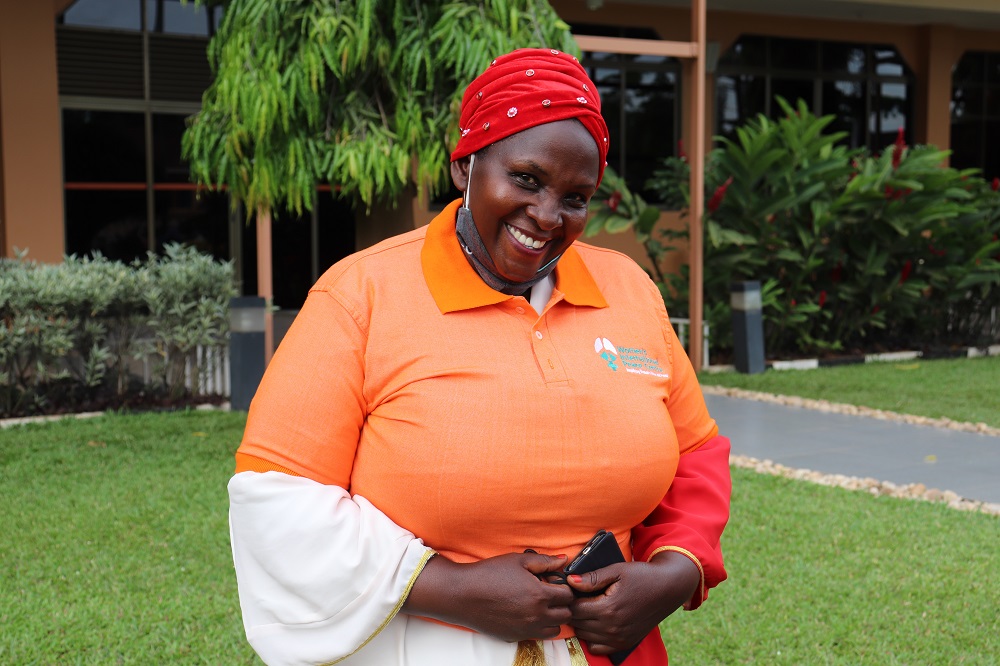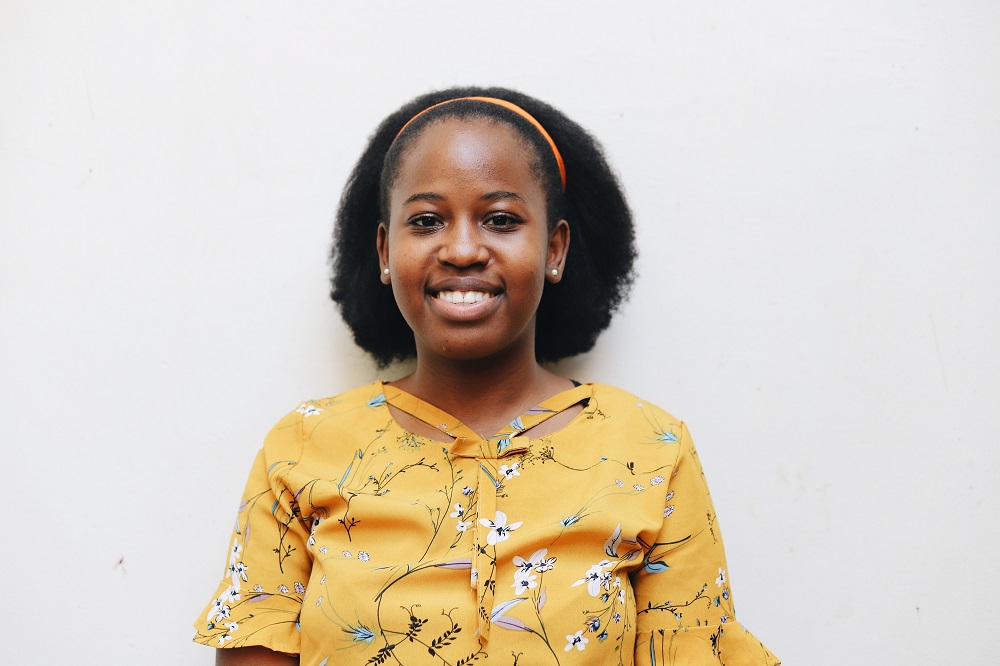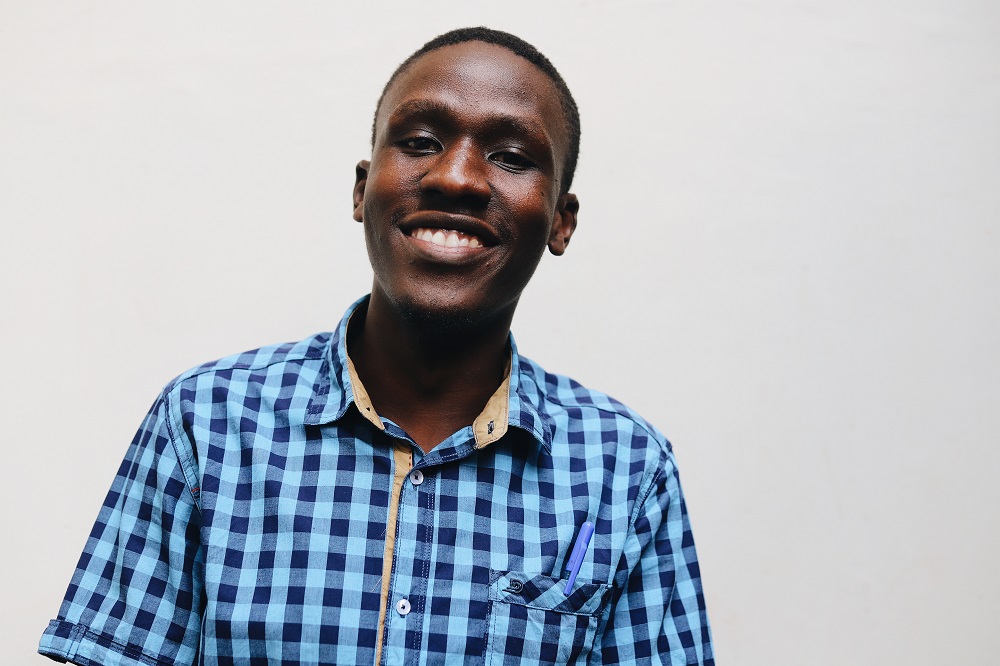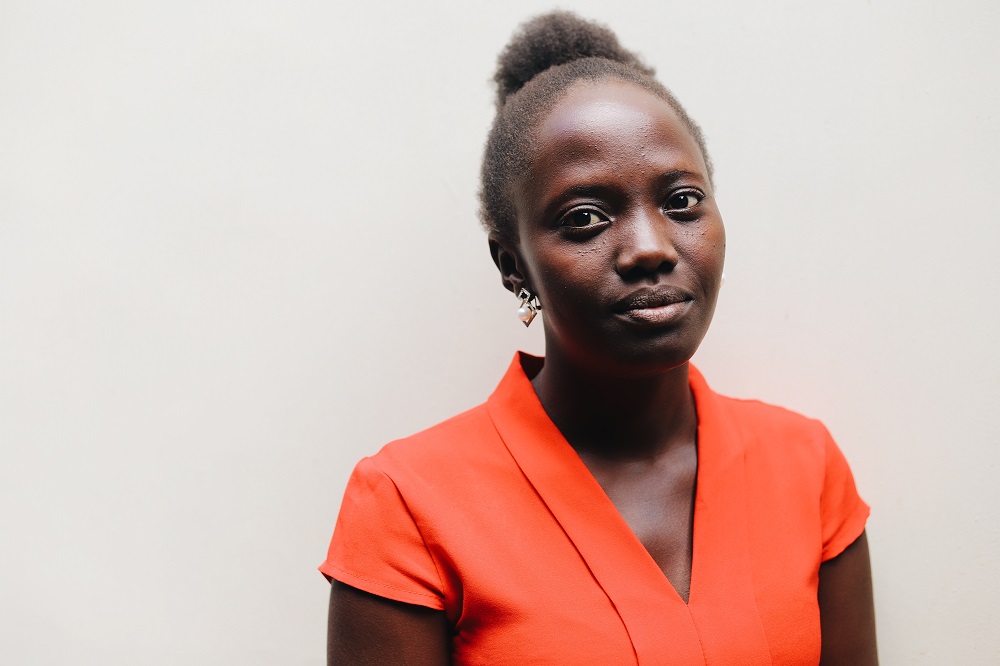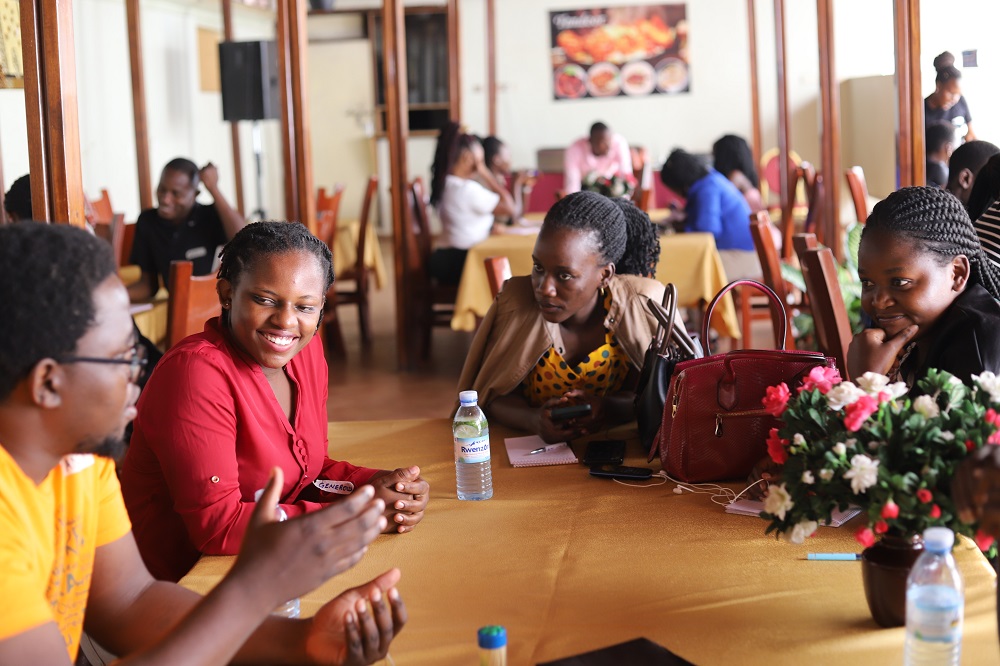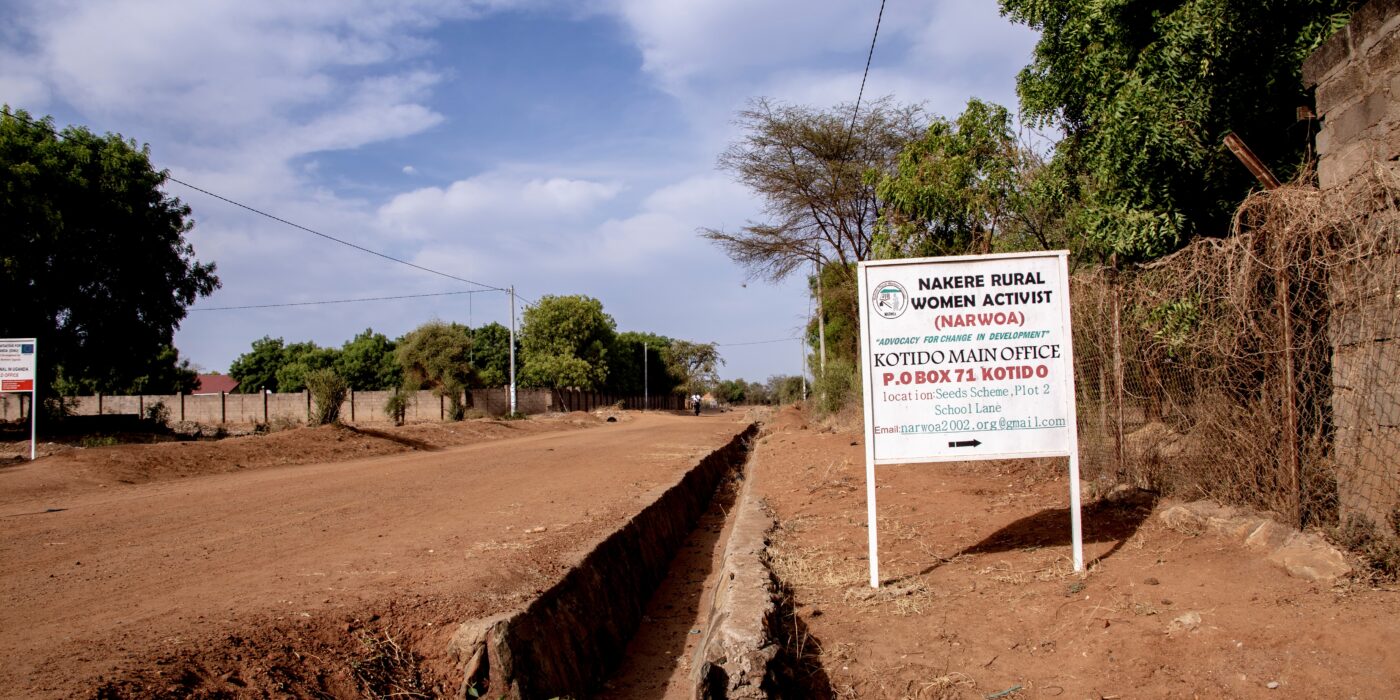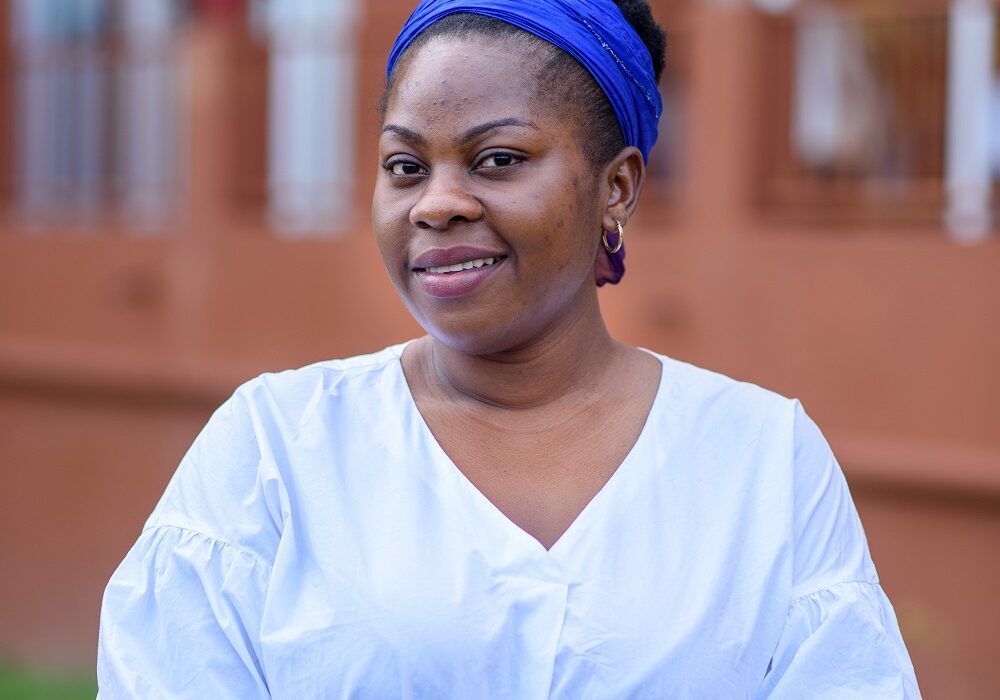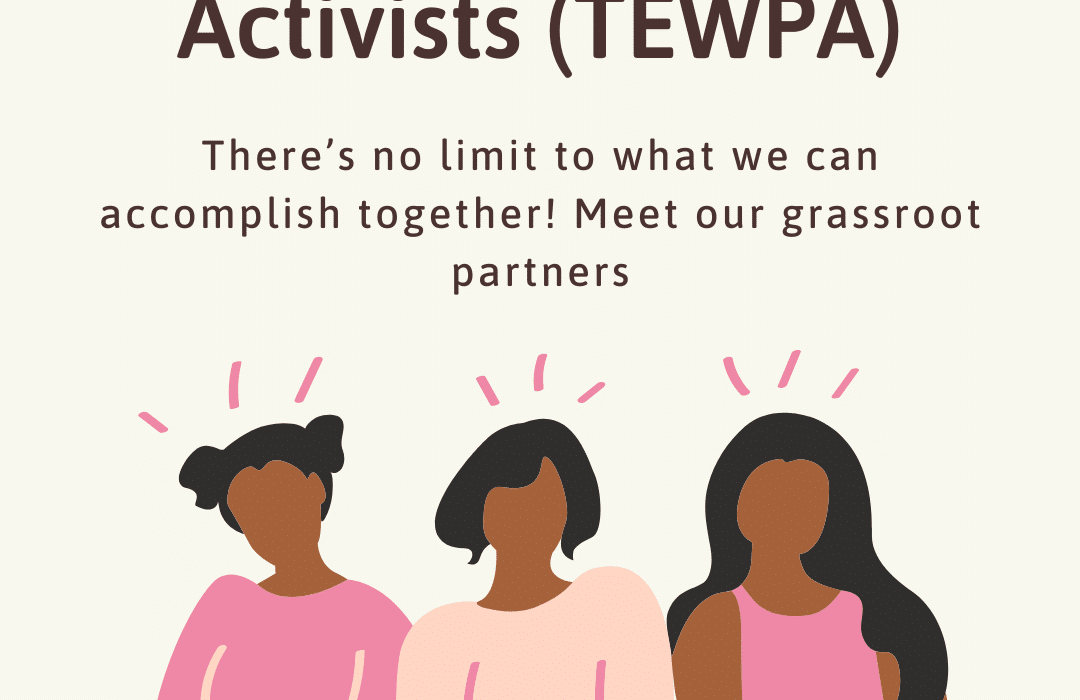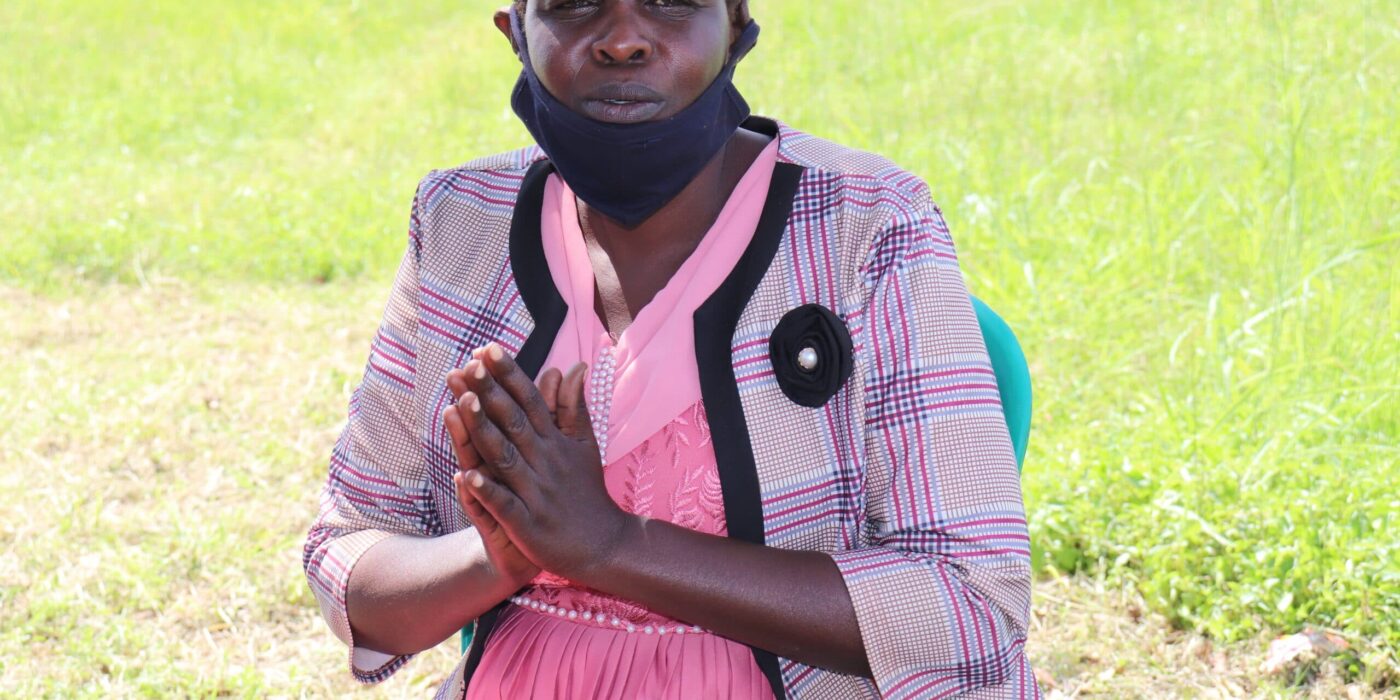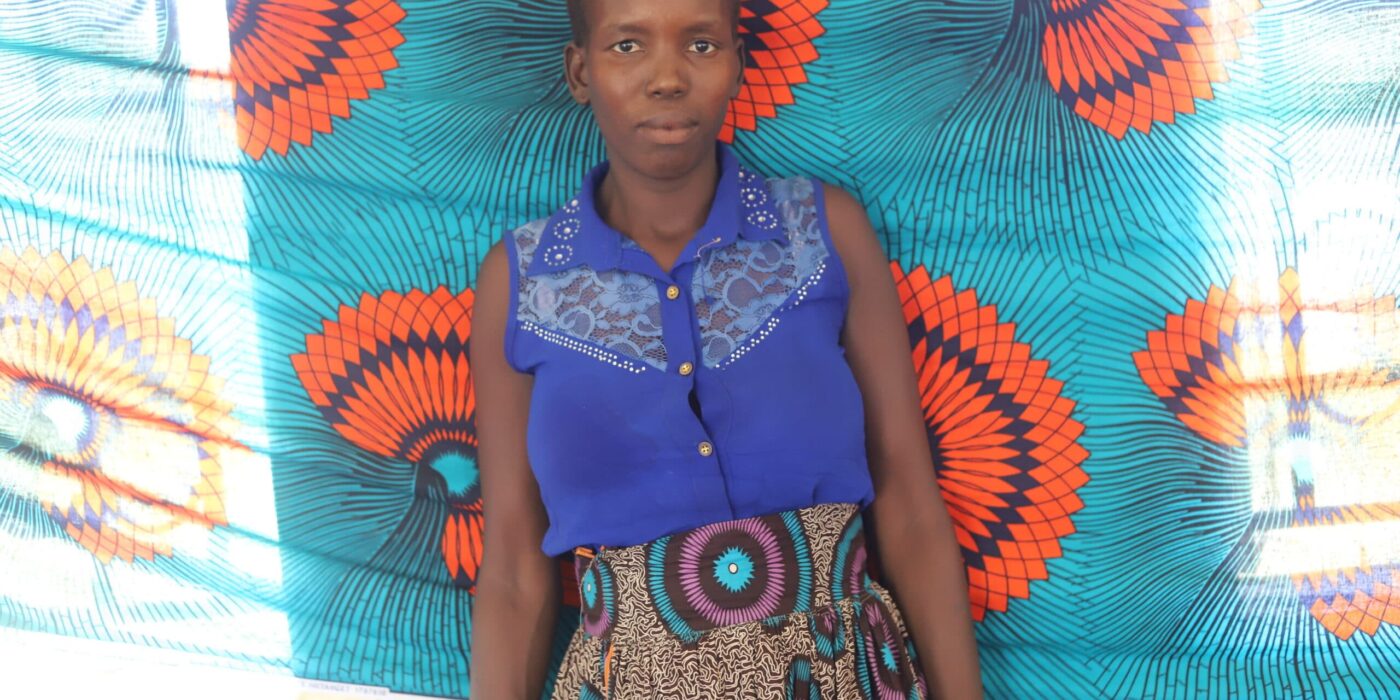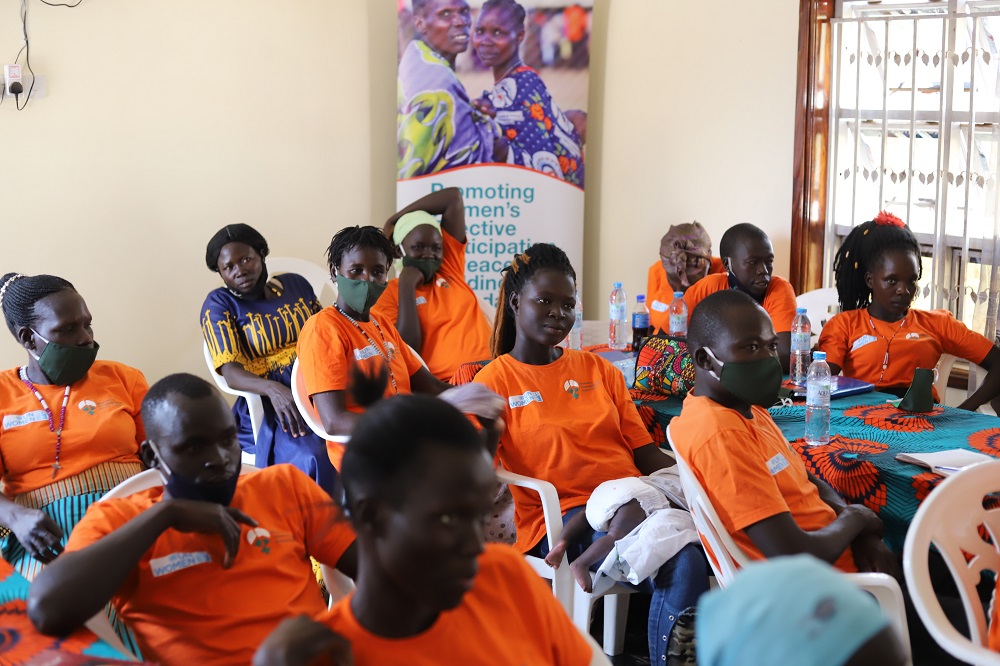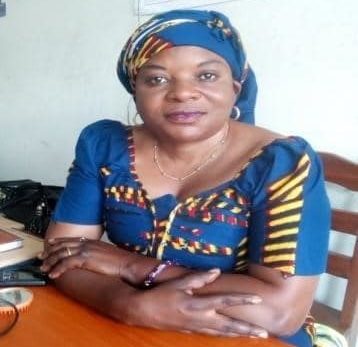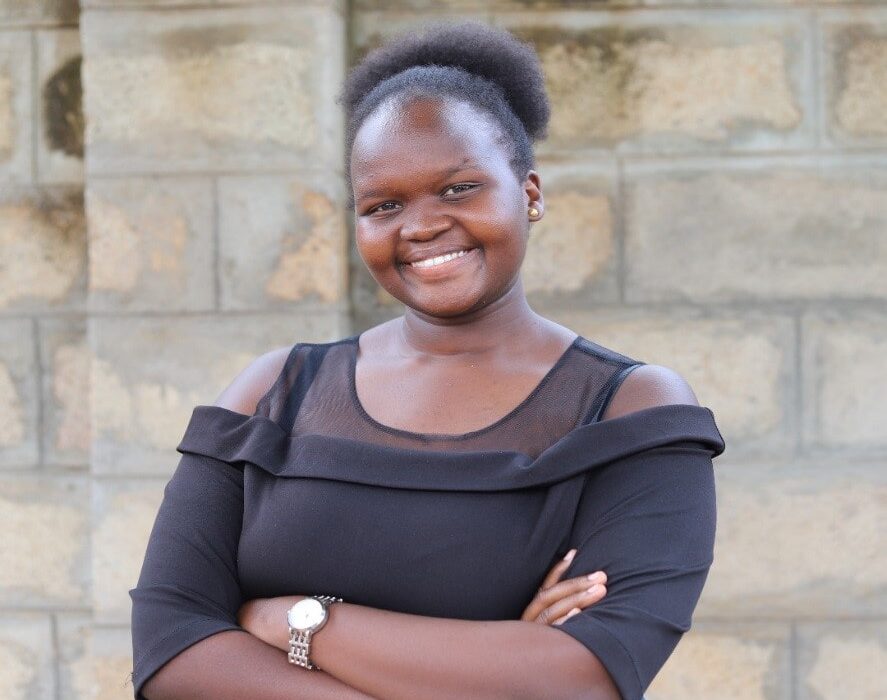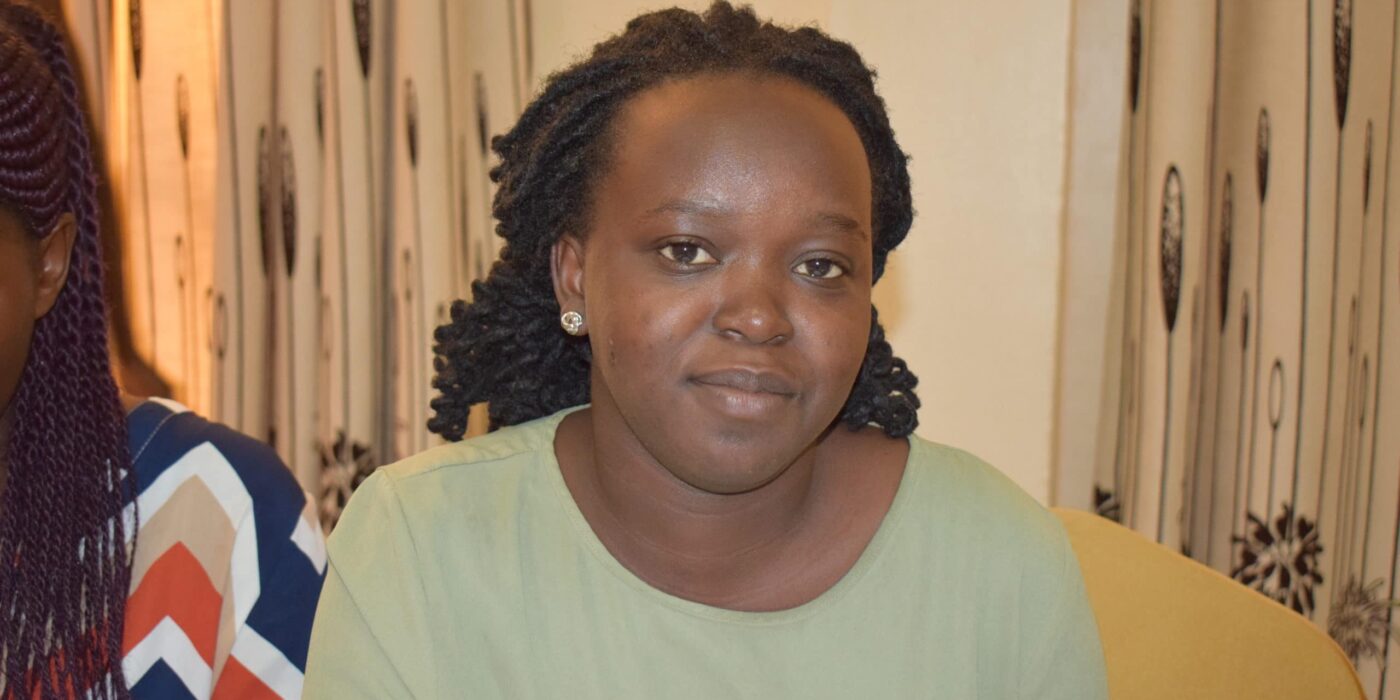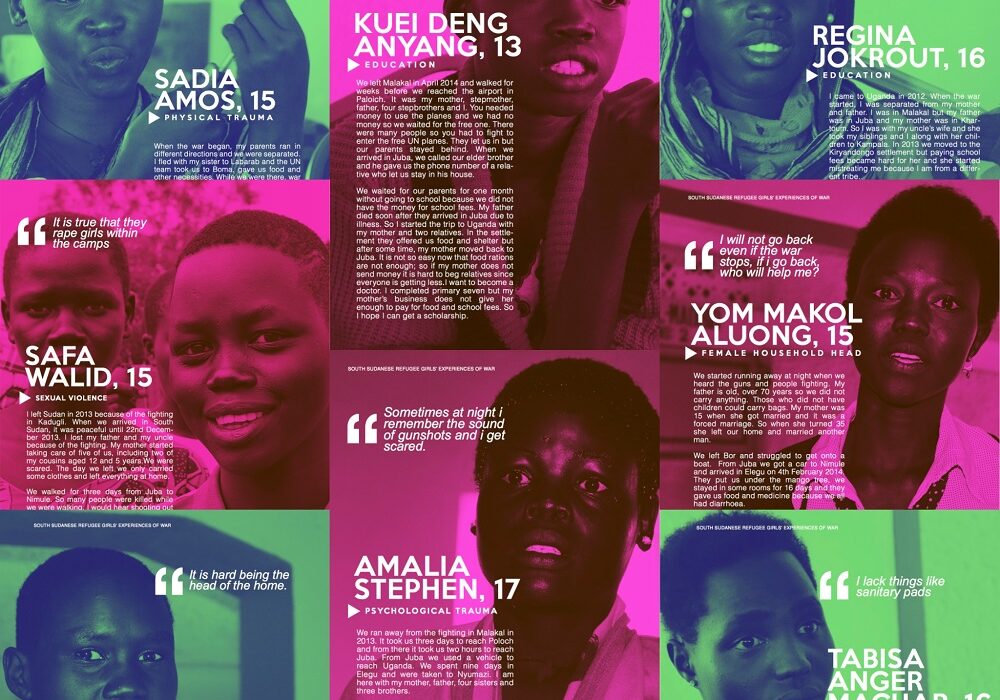Building and Conceptualising Peace: Feminist Strategies and Approaches
Co-authored by our Executive Director, Helen Kezie-Nwoha, Nela Porobić Isaković, Madeleine Rees and Sarah Smith, the article focuses on global governance structures of peacebuilding and the securitization of peace, examining in turn how these operate to block women’s participation and feminist strategies of peace.
Download the Article here: Building and conceptualizing Peace
The Resilience of Young Urban Refugees in Uganda
In January 2022, The Peace Centre trained 30 young urban refugees living in Uganda from Burundi, DRC, Rwanda, Somalia, Sudan and South Sudan on leadership and peacebuilding. The training aimed to promote young urban refugee women and GBV survivors’ leadership in peace-building processes by equipping them with skills and knowledge to fully understand the policy frameworks, design messages, identify opportunities for influencing and plan the next steps in their advocacy.
The following are documented stories of some of the participants of the training and how they have been impacted over time. Here they also share experiences and challenges regarding settling in Uganda. All names used in these stories are pseudonyms.
SALMA
I am the Director of ‘Stand Up and Shine Foundation’, an initiative established to help refugees in my community. As a source of income, I operate a bakery and a tailoring shop. In my community, there have been multiple cases of gender-based violence some of which get to be reported and others that never make it to the light. These to mention but a few include; employers abusing their employees, stepfathers raping their stepdaughters and mothers forcing their children into prostitution in order to secure some income for the family.
On multiple occasions, I have had to intervene in these cases by reporting them to village leaders as well as the Police. However, without much reliance on the police that ‘continues to fail us, I offer counselling and guidance to girls and young women refugees that have been victims of societal vices like gender-based violence. Similarly, I offer training in tailoring and baking skills to these victim girls and young women to help them get their lives back on track.
As a result of the peacebuilding training, I am more informed of my rights as a refugee- what is acceptable and non-acceptable to me, how I can participate in decision-making as a woman and I am more aware of the different ways to defend myself. With this, therefore, I have gone ahead to train other fellow refugees on how to foster peace in their homes and the community at large.
Also, as part of my training lessons, I have mastered the skill of looking for opportunities to better myself in all spheres of life. This has been very instrumental to the growth of my business as I wake every morning with a vision of meeting new people and finding new opportunities.
I hope to see my community change for the better. I desire an establishment of a major training Centre where refugees can be trained in various skills such as English, computer and social skills, baking, cooking and many more that can help them live a decent life even while in a foreign country.
JEANNE
“I had suicidal thoughts at a certain point of my life but that well-being session made me look at life differently thereafter.” Jeanne is a 40 yr old Congolese refugee leader in Kitebi, an area she has been living in for the last 12 yrs since she arrived in Uganda.
Upon learning about mental wellness in the training, I was encouraged to embrace my life as one that is precious and needs to be taken care of. I was also encouraged to stay true to myself, keep positive and be hopeful in all situations.
Today, I am very passionate about mental wellness seeing that many refugees suffer from a lot of stress-related issues but have no knowledge of how to deal with them. I have made it my sole responsibility to sensitize people about taking care of their mental health in my community.
I have since embraced writing as a form of therapy helping me deal with unresolved feelings in my heart rather than bottling them up within. This has helped me remain strong even in the most difficult situations.
Through the writing process, I also encourage my fellow refugees to write down their experiences. ‘This has helped them express their feelings. Above all, I encourage them to be grateful for having Life because with the life they have hope for a better future.
I have also engaged with refugees in some of the settlements where I was taken to work as a volunteer, at the hospital.
I take a keen interest in interacting with women and girls who are victims of gender-based violence in the community. I help them look at life as an always-changing process with both good and bad things happening but one ought to be open-minded at all times.
In cases of rape or defilement, I mobilize colleagues to help victim girls by seeking medical attention from health centres as well as carrying out check-ups, the survivors are introduced to pep treatment while it’s still early and then we report the cases to the persons responsible especially village leaders and Police.
The latter however hasn’t yielded much success as they are not many refugee cases reported in the community that are taken seriously.
I reported a case of a 16-year-old girl that was defiled and became pregnant. Upon giving birth, she was denied a birth certificate from the hospital because of failure to provide evidence for the identity of the baby’s father. When the case was reported to the Police, no help was rendered to the young lady to date.
According to Jeanne, many refugees’ needs are neglected in the communities they live in which makes it harder for them to heal from the trauma of war they faced in their home countries.
“I want to see that my people can sustain themselves, that they have hope to eat, sleep peacefully, can be able to go to hospital and be attended to.”- Jeanne said, “this is the only way I will be fully content as a leader”.
EBONY
Ebony is a Congolese refugee leader heading a saving group for refugees in Najjanankumbi. According to her, this group was formed with an aim of ‘chasing’ poverty amongst refugees so they can all have a better chance at life.
Through the Peace Centre training, Ebony has since become an effective leader in her community; She has learnt how to deal with people, especially when addressing community problems.
For instance, in cases of domestic violence, she mobilizes committee leaders of the group to collect money to buy foodstuffs, sugar, soap, and other home utilities that they carry to the victims’ homes to help settle the matter. With this, they then go ahead to advise the couple against domestic violence and its dangers.
However, due to COVID-19, there have been spiralled numbers of teenage pregnancies and domestic violence cases in the community. These have unfortunately slowed down the response rate of individuals in addressing these matters. Ebony associates these escalated problems with the high poverty levels of people to the point where husbands now beat their wives over very small matters.
“Hunger is making people do what they are not supposed to do; people end up fighting when they are hungry and everything annoys them.”
Through her savings program, Ebony was able to open a mini supermarket as a source of income to sustain her family. In return, she was able to help other refugees with relief, especially in form of food for those that were in desperate need of help.
Regrettably, the supermarket has been closed down due to the failure of paying up the accumulated rent dues that were a result of the Covid-19 Lockdown.
‘It hasn’t been easy since,’ She said, as most members of the group don’t attend meetings anymore. ‘There’s nothing in it for them so they would rather go look for food elsewhere to feed their families.’
Among many things, Ebony is grateful for the training session on wellness as she is using the skills acquired to withstand stress and keep sane even in the hardest of times. She maintains strong courage with the hope that things will get better soon.
She continues to encourage girls and young women that are victims of gender-based violence to keep holding on and not give up while assisting them in any way she’s able to.
Ebony believes that with the necessary assistance, refugees can be able to put their skills and creativity to proper use. That is to say; when they are trained, they should be supported a step further with capital to get their businesses running. Otherwise, without support like that, most of them end up failing to even start.
Women at the Forefront of Conflict Resolution
While powerful gains have been made in the field of Women, Peace and Security at a broader level with an increase in the number of women in politics and governance alongside the national policies and laws, it is still vital to focus on women leaders in religious, cultural and civil society spaces while acknowledging the peacebuilding realities women are navigating through.
Why Young People Need to be Empowered
Valine Samantha Wejuli is the current Vice President of the Makerere Rotaract Club, a position she was voted in after she had been trained in peacebuilding and Leadership by the peace centre in 2021.
Maximising Youth Potential in Peacebuilding Processes
In Uganda, more than 78% of the population is below the age of 30. These represent an enormous untapped potential that can significantly contribute to the country’s political and social development if they are actively involved in influencing, shaping, designing and contributing to policy formulation and development processes. That being said, it is critical that youth inclusively participate in peacebuilding processes to ensure sustainable and inclusive peace.
Read More “Maximising Youth Potential in Peacebuilding Processes”
“We Need to be heard! Our Voices Matter”- Racheal Peace Kanyi
While it’s true that youth inclusion in peacebuilding processes is critical for ensuring sustainable and inclusive peace as recognised by the UNSCR 2250, young people remain largely excluded from formal peacebuilding processes.
Read More ““We Need to be heard! Our Voices Matter”- Racheal Peace Kanyi”
Catherine Birungi Wanyana is Driving Change from the Ghetto
Catherine Birungi is a woman leader from Kibuye 1, Kanakulya zone and also one of the 23 participants of the Training of Trainers community-based facilitators for the peacebuilding program of 2021.
Read More “Catherine Birungi Wanyana is Driving Change from the Ghetto”
Meet Our Alumni: Alice Emasu Seruyange
Alice Emasu Seruyange is an outstanding journalist, media guru who is passionate about gender equality and social justice in Uganda. She is the founder of The Association for the Rehabilitation and Re-orientation of Women for Development (TERREWODE) a non-government organization with the vision of Empowered women and girls embracing the world with improved livelihoods and an Alumni of the Peace Centre’s feminist institute.
After her participation in the Feminist Institute, Alice continued with heightened commitment to support women affected by fistulae to promote social justice. Obstetric fistula (incl. vesicovaginal and recto-vaginal fistula) is present in conflict settings but remains neglected due to its complicated and stigmatic nature. Moreover, fistulae are characteristic of war-torn areas like the Teso sub-region in Uganda, the region that TERREWODE serves.
Given the high need for fistulae repairs in the post-conflict Teso sub-region, TERREWODE under the leadership of Alice has grown in capacity with highly professional staffing, an Executive Board of Directors, with a team of committed medical professionals. Today, TERREWODE has a model institutional infrastructure to continually support the health, psychological and economic needs of women affected by fistulae. Alice shared that attending the Institute training broadened her initial dream of contributing to the transformation of the health systems to deliver for vulnerable women and girls including those suffering from the neglected Obstetric Fistula.
TERREWODE has supported over 800 women and girls fistulae survivors. Alice opened in 2019 the first hospital in Uganda and the third in Africa dedicated to women suffering from obstetric fistula. The hospital conducts 200 surgeries per year and treat and reintegrate 600 women per year;15,000 women and girls affected by fistula treated and reintegrated. The hospital is the first specialized in Uganda and an expansion of TERREWODE, the NGO I founded way back in 1999.
Alice also participated in the development of a National Strategy for Reintegrating young obstetric fistula survivors by the Ministry of Health in Uganda. With her outstanding work on hand, Alice has been recognized and celebrated with:
- The prestigious award for her outstanding Reporting on Population and Development issues, and Economic and SRHR of rural women and girls (Dec. 2007).
- Golden Jubilee Award- Women and Girl Child Empowerment, Government of Uganda (2020)
Alice observes that the experience she gained through the Institute enabled me to be more aware of the impact of SGBV that women and girls experienced suffer in the sub Saharan Africa.
Women and Youth-led Activism for Peace in their Communities.
Women and young people all over the world are playing an important role in peace and development. The leaders trained under the project “Promoting Peaceful Electoral processes in Uganda through Constructive Engagements” with support from the Kingdom of Belgium are from different constituencies, implying the need for a wide range of actors and movements needed to promote stability and peacee in Africa.
In March 2021, The Peace Centre enhanced the skills and attitude of women and youth leaders to effectively promote peace, enhance leadership and development that is gender-responsive. The training covered areas including conflict analysis (peacebuilding and reconciliation), governance, leadership and mediation skills. 101 Women and youth leaders (50 Women Leaders and 51 Youth) from Community-Based Organisations (CBOs), political, religious, cultural groups, and influential leaders took part in the training in the Kampala region.
We documented some of the women and youth peacebuilders’ stories and hope that other women peacebuilders in similar situations can draw learning and inspiration from these experiences.

Jalia Sekamate, Executive Director, Centre for Rehabilitation of Survivors of Acid and Burn Violence, Makindye
“The skills gained from the training inspired the women from Kampala to create and register an association called Women Resilience Centre (WRC). This association aims at bringing together women with different expertise to work together to promote peace in the communities using different approaches such as mediation and negotiation. Immediately after the training, we convened the first meeting and were able to bring together 14 women to brainstorm on the way forward as a group. We invited an inspirational speaker who emphasized the advantage of unity in order to achieve greater things. We later created a WhatsApp group, constituted an Executive Committee with I (Jalia) as the chairperson and Wanyana Catherine as the treasurer and embarked on the development of a constitution and registration process of the association. Our vision is to see the association grow into a big organization that will transform communities.
WRC has so far supported young mothers who were affected by COVID-19 and also those who got pregnant during the first wave. We have also provided counselling services. We have also mediated in cases of child neglect, parents disowning their daughters who got pregnant and GBV cases that have increased in the community due to lack of a stable income and the current lockdown situation. During this second wave, WRC mobilised and visited the neediest communities in Makindye and Rubaga buying them posho, beans and soap.
Unfortunately, the planned business exhibition by the association on 20th May 2021 was not held because of the lockdown however they plan to host one when the lockdown is eased and the spread of community cases has been contained- Jalia Sekamate, Executive Director, Centre for Rehabilitation of Survivors of Acid and Burn Violence, Makindye
Women are strengthening community-led initiatives for peace through this forum, in which they agreed to be a whistleblowers network on SGBV across cross-cutting challenges that undermine women’s agency. By undertaking this work, women leaders are challenging the status quo and promoting equality.

Alawo Florence Zam, Youth Leader, Naguru Barracks Ntinda
In my village, the number of school-going girls getting pregnant is high, especially between the ages of 13 and 15. From the training I was well equipped with communication and presentation skills thereafter, I was able to do some research to determine the number of girls who have not gone back to school due to pregnancy and with this information, I engaged with Alarm Uganda Orphanage to intervene and talk to the families of these girls and allow them to go back to school. We purchased scholastic materials and other necessary requirements for their enrollment in school. We continued to closely monitor the girls’ education and ensure that their guardians provided for them.- Alawo Florence Zam, Youth Leader, Naguru Barracks Ntinda
Poverty is a driver of violence and continuously increases women’s vulnerability to violence in all its forms. This was one of the outstanding discussions during training. Florence used her daily stipend to support 3 women in her community as she narrates below;
“I used to stay in the barracks and I witnessed the challenges that wives to soldiers go through every day due to over-dependence on the man as the breadwinner. Some women would come to me to borrow money to buy food and yet they did not have any source of income to pay back. I used to share with them some food to supplement what they have.
After the empowering sessions during the peacebuilding training, I reflected on how I can help my fellow women in the barracks to economically sustain themselves and their families. I convened a meeting with three women whom I shared with the knowledge acquired and at the end of the meeting I tasked each one of them to identify a small business that they can run within their homestead. I distributed the money equally with each one getting Thirty thousand shillings (UGX.30,000). One of the women started by frying cassava in the mornings and has now expanded to frying samosas as well, another started frying pancakes and the third one started selling Mandazi and has now expanded by selling passion juice. I am glad that these women are growing economically and can support their families as well.
When the husband of one of the women returned from his mission, he was very impressed and happy with how his wife has become creative. When the wife shared with the husband how the story began, he was motivated to come to visit me and expressed his gratitude and thanked me for making such a priceless contribution to his family. Until today all the women in the barracks call upon me for advice and refer to me as their saviour.” – Alawo Florence Zam, Youth Leader, Naguru Barracks Ntinda
These initiatives are a step towards women’s access and control of their economic resources. It guarantees them an improved livelihood, eases their access to healthcare, basic needs and food security.

Nakibuuka Proscovia, Business Woman, Nansana
“As a professional teacher, I have always desired to start up a school of my own but considering the little salary I earn, my dreams have almost been shuttered. My turning point was when I was invited by the Women’s International Peace Centre to attend a peacebuilding training at Hotel Emerald in Kampala. From the training, I am glad to say that my capabilities were awakened and my fears were erased. After the training in March 2021, I took the most important decision that I always had fears about. I resigned from my teaching and decided to do poultry farming as a business which I hope with the projected annual returns, I will be able to realize my goal in a few years to come. After that initial step, I researched the best type of birds to rear, developed a business plan and built the standard house for the birds. Currently, I have 300 birds and I expect my farm to grow to 10,000 birds by the end of the year. I appreciate the Peace Centre for empowering me and motivating me to work towards achieving my goals. I have learnt that life is only for go-getters.”- Nakibuuka Proscovia, Business Woman, Nansana
One of the training sessions covered economic empowerment and women and youth were encouraged to start up small businesses, achieve financial success, as well as take pride and celebrate their accomplishments.
Youth leaders

Nassuna Carol, Youth Counselor, Ggaba
“I was born and raised in a slum area referred to as “ghetto” in Ggaba in Kampala district where the poverty levels are so high. Most youth (boys and girls) in our area indulge in drug and alcohol abuse. To make it worse, the majority of the abusers are aged 10 to15 years old which has resulted in many girls in the same age bracket getting unwanted pregnancies.
After the training from the Peace Centre, I realized I have a big role to play as a Youth Leader in my community, to change the behaviour of the youth. I approached NGOs like World Vision and Uplift Uganda and we discussed effective approaches for intervention in the ghetto given that such groups are very sensitive and suspicious of people who are different from them.
The next day we called a meeting for all ghetto youth and here we convinced them of how they need to save for their future. From the meeting, the youth agreed to save UGX.2,000 (Two thousand shillings) every day and we formed a saving group called Achievers and Innovative Youth Savings Group which currently has 16 members actively saving. They started saving in April which has now accumulated to UGX.2,000,000 however since the lockdown in June, the group stopped saving but hope to resume when the current situation has eased. I am happy to say that most youths have taken up the saving culture as the driving force to reduce the money they were spending on buying drugs and focus on saving for their future needs.
I have also engaged with different organizations like Red Cross and Living Goods: a voluntary organization that trains door to door delivery services for pregnant mothers and children. In this period, we’ve managed to distribute food and sanitary materials to elderly women, pregnant mothers and children.
At a personal level, I thank the Peace Centre for empowering me to use my voice to influence change in my ghetto and I have gained confidence and knowledge and will use my voice to change the attitude of my fellow youth.” Nassuna Carol, Youth Counselor, Ggaba
Carol continues to cultivate leadership qualities and skills among young people in her community building on their knowledge and experience in leading change in their community.
Environmental conflicts are about power and structural inequalities, it is important to have solutions that address those root causes. The ways of addressing them vary and include community capacity building, class actions, litigation and movement building. Timothy and his organization EcONUTA Food Waste Company are working to promote food security and protect the environment by recycling and reusing food.

Timothy Mununuzi, Nutritionist
“This training was an opportunity for me to enhance the conceptualization of my project on Food Wastage and Hunger in Uganda. During the training, one of the sessions focused on environmental conflict and degradation, and also provided us alternatives on recycling and reuse. After the peacebuilding training, I reflected on a project that falls within my profession as a Nutritionist. Back home most people pay for garbage collection which largely constitutes the left-over foods from different homes. Out of this, I realized there is a lot of food wastage in my community which can be reprocessed either as manure, energy regeneration or distributed to vulnerable communities to supplement their food.
I am developing a proposal to start up an initiative to empower fellow youth through recycling wasted food. I plan to coordinate with hotels and restaurants in order to secure the supply chain which we shall later sort and categorize for different recycling processes. Currently, I am doing a lot of research with other firms to come up with a clear operational plan. I am determined to get more knowledge and skills to make my ideas realistic and beneficial to my community.”- Timothy Mununuzi, Nutritionist
The progress so far achieved by these women and youth leaders shows the urgency in empowering women and youth peacebuilders, mediators and agents of change. Peacebuilders continue to work on a range of socio-cultural, political, economic, environmental, personal and community level interventions as documented above, to minimize the impact of inequalities and conflict fragility. The various initiatives are reflective of strengthened capacities, improved competencies, personal growth, changing knowledge skills and practices to promote a culture of peace. The Peace Centre is committed to providing spaces and amplifying these voices of women and youth for peace and security.
Meet our Grassroots Partner- Nakere Rural Women Activists (NARWOA)
Nakere Rural Women Activists (NARWOA) is an umbrella Community-Based Organization for women groups that started out in November 2002. The group converged for meetings under a tree locally called ‘Ekere’ thus the name Nakere Rural Women Activists. It was established as a community response to the humanitarian crisis in Karamoja, to address cross border and inter-ethnic political instability, the rise of warlords, high domestic violence, and discrimination of women in the society and overall adverse poverty. Read More “Meet our Grassroots Partner- Nakere Rural Women Activists (NARWOA)”
Creating a Movement of Women Peace Builders and Mediators, Meet Noella
Noella Kabale Kalu is a Gender Equality Activist, Social Entrepreneur, Peace Mediator in the Congolese refugee community in Kampala and an alumna of our 2020 Feminist Leadership Institute. Following her training, Noella has been able to share the knowledge acquired within her community, create intensive awareness around peacebuilding and conflict resolution, and mediate conflict amongst community members at the household and community level using the feminist ideology of promoting love, empathy, and unity.
Read More “Creating a Movement of Women Peace Builders and Mediators, Meet Noella”
Meet Our Partner- Teso Women Peace Activists
This quarter, we shine a light on Teso Women Peace Activists (TEWPA), a women-led organisation taking the lead to advance peace, resolve conflict, build tolerance and justice, in the Teso Region.
About TEWPA: Formed in 2001 by Cecilia Engole following her participation in the Isis-WICCE Institute to respond to the challenges that women and girls face during and after conflicts. Teso Women Peace Activists (TEWPA), designs peace building and conflict resolution projects/programs that are issue based; and organize focused peace building training for TOTs in communities, for sustainability and as an effort to create lasting peace. TEWPA’s focus is peacebuilding, conflict transformation, democratization and human rights. Read More “Meet Our Partner- Teso Women Peace Activists”
The Unstoppable Woman Leader Promoting Peaceful Elections in Kapelebyong
By Esther Wasagali
Akol Ketty is a woman leader and a testament to women’s ability to build peace and influence change against all odds.
When we first met Akol in August 2019, she had served as a Community Mobiliser, Facilitator, Councilor and most recently as the Vice Chairperson in Kapelebyong District Local Government. She had first hand experience of the limitations women experience as they seek to take leadership or to address the issues that make elections violent and undemocratic.
“Women are often discouraged from taking on leadership positions, they always receive negative comments from men and fellow women saying they cannot stand for some positions because they are earmarked for men. Women are also denied participation in political processes by their husbands, who often think that women will be exposed to other men. Women in my community could not balance home and leadership roles. They had no confidence to speak in public,” Akol recounts.
Read More “The Unstoppable Woman Leader Promoting Peaceful Elections in Kapelebyong”
Peace Is Possible with Refugee Women in the Lead
By Diana Oroma
“I used to see conflicts happening in my community but I was silent about it because I didn’t know I had the power to influence change and contribute to peace Janet Ayoo Kelly declares.
Janet Ayoo Kelly, aged 28 years is a first time refugee living in Maaji III refugee settlement, Adjumani district in West Nile, Uganda. In July 2016, she fled her hometown, Magwi in South Sudan with her first child who was 2 years old at the time.
However, the situation upon arriving in Uganda was very difficult. “We left all the resources we had worked hard to gain and fled with nothing I had hoped to settle down and rebuild my life”she recalls. She is part of a group that makes bed sheets and tablecloths a source of income for their families. Janet is also now the secretary for the Adjumani Women Peace Mediators Network.
In December 2019, Janet was one of 156 women leaders from Kotido, Yumbe and Adjumani districts trained on peacebuilding and reconciliation by the Peace Centre with the support of UN Women. Following the training, the women leaders formed Women Peace Mediators Networks.
In Maaji III refugee settlement, the women peace mediators developed a community action plan to ensure their participation in peace building right from their homes to the wider community. Since then, women peace mediators have identified, reported and mediated 300 conflict incidents including conflict between refugee and host communities and gender-based violence specifically early marriages that led to withdrawal of girls from schools.
In February 2020, the women peace mediators met again in Nyumanzi settlement to discuss their peacebuilding efforts and learn from experiences in Adjumani, Yumbe and Kotido. Janet learnt of the work that her fellow peace mediators were doing in their communities . She was touched by their stories such as the case involving a young girl form a poor family whose father was forcing her to get married to an elderly rich man who lives in America. The mediators engaged the girl’s family, who abandoned the idea and asked the women to pay for her school fees since they wanted her in school. The women peace mediators then referred the girl to an organization for a scholarship.
Janet also recalls the stories from Kotido where women were mediating large scale conflicts., the The women peace mediators had convened 14 peace dialogues resolve the conflict characterised by rampant cattle raids, illegal guns owned by civilians, food insecurity, sexual and gender based violence against women and girls.
On 10th May 2020, a small disagreement among five Nuer and Dinka youth in Maaji II refugee settlement escalated into a violent tribal conflict leaving two young men dead. Janet was spurred to action.
“As women peace mediators we realized that the situation was getting out of hand. The situation was very tense, with women and children running up and down. Immediately we gathered together to agree on what to do. We informed the Peace Centre who guided us. We then made a phone call to the refugee settlement commandant asking him urgently to call the police to intervene” Janet recounts.
The Resident District Commissioner (RDC), Refugee Desk Office, and District Police Commander immediately responded by deploying police to calm the situation. Janet and the other women peace mediators also took further action.“We rescued the children from the two families who were being attacked for having started the fights and kept them in a safe place“Together with other leaders in Maaji we continued comforting the family that had lost their son and the one whose son was missing and later found dead. We convinced the families not to get involved in the fight and keep away from revenge as it would only cause more harm”she narrates.
Twelve days later, on 22nd May 2020 The Peace Centre convened a peace mediation dialogue in Maaji with key leaders including the RDC, District chairperson LC 5, District Vice Chairperson LC 5, District Peace Committee, Office of the Prime Minister, UNHCR, Lutheran World Federation, Refugee Law Project, Religious, Cultural, political leaders and the Adjumani women peace mediators. The dialogue discussed the conflict situation, identified the triggers and agreed on specific actions to take to ensure conflict indicators are reported to the police and other duty bearers before they escalate.
During the mediation dialogue, the women peace mediators identified the dark hot spots where the violent youth were hiding such as the banana plantation which was acting as their habitat. Janet and the mediators also made specific demands. “We wrote to the Office of the Prime Minister requesting for security lights in the settlement blocks where the youths were hiding to chase and beat women moving to access the health centre at night. I was personally affected by this. I gave birth on the way because I was afraid to pass at the dark spot alone at night when labor started. The lights were installed” she shares.
The women peace mediators continued their work in a follow up mediation dialogue w on 1st July 2020 where conflict early warning indicators were presented to the leaders for redress.
“For sustainable peace in the settlement we continued to engage with the youth and their families by encouraging them to keep calm and sensitizing them about the consequences of violent actions to their lives and families”, Janet narrates. She explains how the work of the women peace mediators brought positive changes, “we continued to monitor conflict early warning indicators and shared with the leaders for their action. For example some youth were spotted in the evenings with walking sticks. Others were seen holding isolated meetings in the local languages. Each tribe stopped their members from crossing where the other tribes live, which kept people in fear. “I am celebrating my breakthrough because of the hard work. I believe that peace is possible with women at the lead. I am now seeing friendship being nurtured again between the Nuer and Dinka youths. They have started having friendly football matches again.
“My skills have doubled. I can now analyze the conflicts and participate in peace building more effectively. I used to see conflicts happening in my community but I was silent about it because I didn’t know I had the power to influence change and contribute to peace,” Janet says, reflecting on her growth as a leader and a peace builder. I am very grateful to the Peace Centre and UN Women for the skills I obtained. I’m proud to be a peace mediator in my community” says Janet.
Community Activists Lead the Fight Against Gender Based Violence in Adjumani District
Read More “Community Activists Lead the Fight Against Gender Based Violence in Adjumani District”
Catching Up with Our Leadership Institute Alumna- Martine Kaliza Mirindi
Martine Kaliza Mirindi is an alumna of the 2013/14 Leadership Institute promoting women’s and girls’ rights and advocating for peaceful resolution of conflicts in North Kivu province of the Democratic Republic of Congo. She is the founder of Women for Democracy and Fight against Violence (WDFV), is very passionate about serving and defending the rights of the most vulnerable. Martine holds an Advanced Degree in Law, specializing in Private and Judicial law from Université Ouverte/CIDP-Nord –Kivu completed in 2007 Martine intends to join political leadership to apply her innovative ideas for the common good of the people of the DRC. She is also passionate about a number of things including love, nature, music, drama, dance.
Martine, the Natural Leader
“I am passionate about feminist leadership and often I think for me it was inborn because even in our family, there is no decision that can be taken without my say. This applies to my work as well as in all the associations and groups where I belong, I am always chosen as a leader. I believed that the institute would help me to gain sufficient knowledge and the necessary tools on leadership.”
Participating in the 2013/14 Leadership Institute on Peace Building and Human Security
Martine chose to take part in the institute in order to enhance her leadership and peace building skills but also understand the experiences of other women leaders. The institute lived up to her expectations and she readily lists some of the key lessons that are maki a difference in her work.
“I clearly understood, what it means to be a leader, how one becomes a leaders and ways to overcome our challenges as women leaders. The facilitators positively impacted my time with the institute.We always had to give feedback about what we had learnt during the training and mine was always positive feedback. It was quite a good interaction because it strengthened both the young women and senior members of civil society organizations in the training.“
Following the training, Martine was able to work out different strategies in order to succeed even in small things that she often neglected but were very important for the community. She raised awareness among women who were not formally educated, to get them involved in public life at the grassroots level. Martine replicated her institute experience and focused on strengthening the women’s leadership skills for the benefit of the community.
Challenges of Women’s Leadership
Despite her passion and drive, Martine talks about the challenges demoralizing women peace builders. She mentions stigma, the lack of meaningful progress in the fight to promote women’s rights, and some men who are opposed to the common cause of women’s empowerment.
“In order to overcome these challenges, we have been organizing meetings among women themselves as well as those with men in order to discuss and share knowledge on themes about women’s rights advancement. It has helped a lot in bringing cohesion and harmony as well as leading to some men to be part of the women’s cause.”
Martine has several plans and dreams for African women, for instance, giving them the opportunity to design projects and receive support to meet the needs of vulnerable people. She hopes to use all she has learned from various trainings to contribute to enriching women’s work.
“I have attended several training sessions at the national level in Kinshasa, at the provincial level in Nord Kivu and South Kivu as well as on the international level in Burundi, Rwanda, Thailand and Uganda. The trainings focused on advocacy, electoral processes, gender-based violence, UNSCR 1325, civic education, gender and elections, restorative justice, gender and protection, leadership and gender mainstreaming in projects.“
Advice to Younger Women Leaders
Martine advises, “In order to be able to participate in the decision making processes, join non-violent movements, women groups or political parties. Engage in entrepreneurship so as to economically empower yourself as a young leaders. Consider attending the Leadership Institute.”
In closing, Martine highlights the importance of solidarity among women as critical to promoting gender equality in professional life and in day to day activities.
Passionate about South Sudan Politics and Women’s Rights: Q&A with Rachael Juan
What is your role at Women’s International Peace Centre ?
I’m a Project Assistant and Focal Point for South Sudan at Women’s International Peace Centre. It is an exciting job as I engage with many people that share our vision as an organization. The young enthusiastic women are the most exciting because we have mutual dreams and goals for the women and girls of South Sudan.
I’m the go-to person for news updates on South Sudan especially those in line with women, peace and security.
What led you to this career?
I grew up in a foreign country and never got experience from my country, South Sudan. I listened to grievances of my people and this was motivation enough for me to build myself to be of influence to humanitarian interventions, policy formulation and implementation. I have also read a number of books and articles urging young people to pay attention to politics and policies. This is the only way our livelihoods will not be legislated out of existence. This is why I chose governance and international relations.
What’s one professional skill you are currently working on?
I am working on building my conflict resolution and peacebuilding skills. My aim is to become one of the experts and strategists seeking to realize lasting global peace.
What’s your go-to productivity trick?
I watch documentaries related to the work I do which ignites my motivation. These are usually sad documentaries on conflict and post-conflict situations because of the long conflicts in South Sudan. This reminds me of the urgency and need to get the work done now.
Music is also helpful especially preparing a playlist to match the work I’m about to do. In addition to that, I inform those around me about the work that I need to do so that they hold me accountable for what is not done. These have been quite helpful and I would recommend that we explore what works for us to be productive at all times. Let’s not forget the in-between 5-10 minute breaks with fruits and nuts.
How has COVID-19 affected you or what have you learnt about the importance of our work during this time?
From anxiety to panic to acceptance. The coronavirus disease has affected my personal and work routines. It is exasperating to believe that 2020 was going to be a great year not only for me but women working for peace and security. With the closure of borders and restrictions put in place, there has been a negative impact on sources of livelihood and other existential activities. Sexual violence and gender-based violence continues to prevail even through the pandemic. This is a lesson learnt for feminist organisations. We must continue to strive to provide physiological needs, protection and legal services to women and girls across the world.
What energizes you at work?
Believe it or not, I like organizing materials. A new set of pens, notebooks or sticky notes always renew my motivation to do my work. In addition to this, I like collective or communal work where we have to work together to achieve an objective. It is always exciting to get ideas from colleagues. The happy hour that prioritizes wellness at The Centre is another powerful energizer that encourages us to relax and have discussions that are not work-related. This helps us to relax and resume work with fresh and optimistic minds.
The one thing that surprised me about working at the centre was wide-ranging nature of women, peace and security(WPS). Before I joined the Peace Centre, I never imagined how broad the WPS agenda is. I am learning and I love it. It has created a community of women that I can rely on to increase my knowledge and skills and further transform my attitude as a young woman professional.
What is a work-related accomplishment that you’re really proud of?
Being able to take the lead in creating a platform for 20 South Sudanese young women has been a bonus in my work-related accomplishments collection. This group that is called Young Women Leading for Peace has got enthusiastic brave and talented young women that are working to contribute to sustainable peace in South Sudan.
If you could snap your fingers and become an expert in something, what would it be?
I would really love to become an expert in conflict resolution, building peace and leading a country with accountability and legitimacy. This is driven from the passion I have to exist and live peacefully with others in a nurturing and fair environment. Imagine having robust skills, attitude and knowledge to bring sustainable peace in the world. We need this expertise now more than ever now.
What energizes you outside of work?
Shopping. Be it clothes, tiny necklaces, home décor, perfumes or food for my myself and my loved ones. Music is another powerful energizer. I don’t want to imagine a world without music. If I have many errands and chores waiting for me, I usually lose the interest to do them but with music, anything is possible.
What is one book or moment that changed you, and why?
Evening Primrose by Kopana Matlwa. From the beginning of the book, I knew it was going to change me. It highlighted the vital role of love and acceptance of oneself and others. I recommend it to everyone.
What is one of your favorite memories from the past year?
Definitely my graduation day. I felt many things. I was nervous but mostly excited. I finally saw myself a step closer to becoming Dr. Juan, for the thrill of it and because Dr. looks great attached my name. I had obtained a Bachelor’s degree in Governance and International Relations with honours. I think the best gift to give every child is education. Education coupled with life skills nurture us, build us and expose us to all that life offers.
What advice would you give to women interested in working to advancethe women, peace and security agenda?
I would advise them to be as committed and consistent as possible. Read and build intellect. Self-care is important. You have to take care of yourself so that you take care of others. It is a great field and we should all be part of it.
Meet Our Young Woman Leader from South Sudan.
Pikyiko Eunice Jacob is one of the young women who have gone through the Peace Centre’s leadership training. She is a South Sudanese young woman leader currently working with Crown The Woman- South Sudan as a project officer. Crown the woman- South Sudan is a women-founded and women-led nonprofit. It is a non-governmental, non-political, humanitarian and national grassroots organization that aims at empowering girls and women to ensure they harness their potential and contribute to nation building economically, socially and politically.
Eunice describes herself as a hard worker and a good listener who is trying to do her work to the best of her abilities.
“I love to learn new things, because the world keeps changing and I’m inquisitive by nature, I tend to ask questions so I can learn.” she says.
Eunice’s first interaction with the centre was when she attended a workshop/ mentorship session in November of 2019 in South Sudan. She shared her passion for working on women issues and trying to find ways to empower them. “The Peace Center made me realize that this was an achievable goal and my capacity was built during the mentor-ship session.”
Her realization was further built on when a group of young South Sudanese women were chosen as representatives visiting Uganda to learn and share experiences with The Peace Centre. Here Eunice was taken through practical ways in which she could become a better leader and was also able to draw up a vision board for her next 5 years. “I relate to The Peace Centre because they are empowering young women, helping them realize their passions and figure out how to achieve them. “
Eunice remarks that her journey with Women International Peace Center has been the best journey so far of her life so far. It’s not only been engaging but has also been very empowering. It helped her build her capacity, especially as a public speaker. Although she admits that she’s not exactly where she is and she is always working towards the one hundred per cent stance. She’s sure that with the continuous support of The Peace Centre she will be able to convey information with the confidence she previously lacked.

“Before working with The Peace Centre I was just a young woman that had a lot of dreams and aspirations but didn’t know how to put my point across. My dreams were big with no way of execution, However, with the centre’s help I was able to identify the different ways I can make a change in my community, how to present myself and it has broadened my thinking capacity, and how to adapt in my community.”

Her experience at the peace centre helped her realize that “you don’t have to wait to graduate to become a leader or have a leadership role”, “being a leader is not about your age, experience or qualifications. It is a calling.
When asked about her stance on feminism she replies, “I was not a strong feminist before but with the various conversations and books I have read about feminism, I have realized that we women should fight for our rights in the community be it small or big, to have equal opportunities. I have also learnt that I can’t effectively do my work if I’m not looking after myself or exercising wellness.
Peace and Security for Refugee Girls from South Sudan
in the West Nile sub-region, to contribute to the national review and design of Uganda’s third
UNSCR1325 NAP. Their stories revealed experiences of psychological and physical trauma;
continued risk of sexual violence such as rape and early marriage; limited access to personal
hygiene necessities including sanitary pads; low-quality education; exclusion from meetings or
decision making; and in the case of female household heads, limited access to land to grow
crops in addition to insufficient food rations. Hear directly from Safa, Tabisa, Yom, Arual, Kuei,
Regina, Amalia and Sadia – SouthSudan Refugee Young Women Peace Security_


